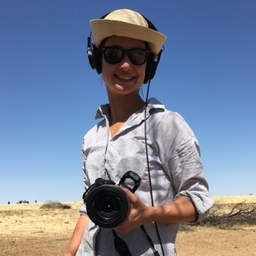
Belinda Smith
Journalist at ABC Science
Journalist 🖊 @ABCScience 🎙 @RadioNational // Tell me a story: [email protected] // GPS art IG: animalpunruns // @[email protected]
Articles
-
5 days ago |
abc.net.au | Belinda Smith |Fiona Pepper
A couple of months ago, a killer started mobilising off the South Australian shore — one that would wipe out marine life, make surfers feel sick, and smother picturesque beaches in thick foam. The culprit? A bloom of tiny organisms called microalgae. We can't see them with the naked eye, but in big enough numbers, they can devastate ecosystems. So what made the South Australian algal bloom so lethal, and can anything be done about blooms like it?
-
1 week ago |
abc.net.au | Belinda Smith |Fiona Pepper
If you were impressed by generative AI such as ChatGPT, then artificial general intelligence or AGI promises to really knock your socks off. Over the past couple of decades, tech companies have been racing to build AGI systems that can match or surpass human capabilities across a whole bunch of tasks. So will AGI save the world — or will it spell the beginning of the end for humanity? Learn more on Lab Notes, the show that brings you the science of new discoveries and current events.
-
2 weeks ago |
abc.net.au | Belinda Smith
The next time you pick up a bag of spuds from the supermarket or fill up the car with petrol, you can thank a treaty signed 150 years ago for the metric system that underpins daily life. On May 20, 1875, delegates from 17 countries assembled on a Parisian spring day and signed the Metre Convention, also known as the Treaty of the Metre.
-
2 weeks ago |
abc.net.au | Belinda Smith |Fiona Pepper
The next time you pick up a bag of spuds from the supermarket or fill up the car with petrol, you can thank the Treaty of the Metre for the metric system that underpins daily life. The treaty was signed exactly 150 years ago, when delegates from 17 countries gathered in Paris to establish a new and standardised way of measuring the world around us. But the metre's inception predates the treaty that bears its name by nearly 100 years.
-
3 weeks ago |
abc.net.au | Belinda Smith |Fiona Pepper
Southern right whales (Eubalaena australis) were named by whalers because their high oil content made them the "right" ones to kill. In the decades since whaling was banned, southern right numbers increased — but a new study shows that population growth stalled, and might've dropped a bit, despite current numbers still far below what they were in pre-whaling times. So what's going on with the southern rights?
Try JournoFinder For Free
Search and contact over 1M+ journalist profiles, browse 100M+ articles, and unlock powerful PR tools.
Start Your 7-Day Free Trial →Coverage map
X (formerly Twitter)
- Followers
- 1K
- Tweets
- 8K
- DMs Open
- No

... and I'll be the supporting act tonight 👇 Talking sciencey stuff with DA from 8pm AEDT 🤘

🎧 Catch me on ABC Radio Melbourne tonight from 8.30pm AEDT - I'll be chatting with @dontattempt David Astle about my research on rogue #stemcells in the #gut and #stomach. You can listen live here: https://t.co/49mdDO42OJ

Very very proud of my other half who’s nabbed a #MetcalfPrize. Very very disappointed that a cold virus means I can’t see the preso in person

@Flanagan_Lab @MonashBDI Dustin says the #MetcalfPrizes will be really useful in growing his research network not that he’s returned to Australia from Scotland. https://t.co/ZDLCuKNp4t

RT @AusStemCell: >> Can stem cells make drugs to stop osteoarthritis? Jiao Jiao Li @UTSEngage >> Stomach stem cells behaving badly: Dustin…